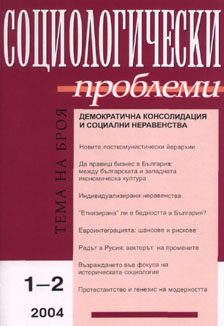Стратификационни последици от градския реституционен процес в посткомунистическа България
Stratification Consequences of the Urban Restitution Process in Post–communist Bulgaria
Author(s): Stefan VidevSubject(s): Social Sciences
Published by: Институт по философия и социология при БАН
Summary/Abstract: The article advances the thesis that the restitution process as a kind of denationalization possessing compensatory functions is dual in nature. The basic characteristics of two main East-European restitution models are explicated: the legal, reducing restitution to a compensatory mechanism; and the economic, treating the restitution process as a kind of denationalization. The essential differences between restitution and privatization, and the stratification consequences these processes exhibit, are comparatively analyzed. The socio-historic prerequisites which determine the transition between previous and present owners, as well as the mechanisms which constitute urban restituents as a social category, are investigated. The two basic types of social stratification produced by the urban restitution process are contrasted: the primary, limited to the property rehabilitation of the pre-Socialist elite inheritors; and the secondary, constituting the result of type of post-restitution behaviour chosen, as well as of the kind of restitution assets and their economic significance. The conclusion drawn is that the restitution mechanism produces hereditary privileges, which cannot be preserved outside the market mechanism; and that the emergence of new post-restitution social strata can be expected only in the case of restituents infiltrating their respective properties in the market system and constituting themselves as economic subjects.
Journal: Социологически проблеми
- Issue Year: 36/2004
- Issue No: 1-2
- Page Range: 201-215
- Page Count: 15
- Language: Bulgarian
- Content File-PDF

